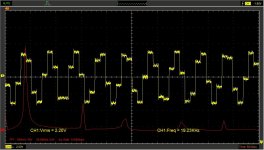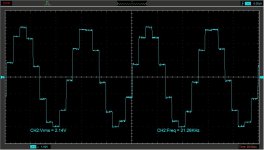To me, I listened to two DACs they use the exact same chipset, they both have identical wall warts that comes from the same factory. They both support the same connectivity. One sound clinically boring as Nixie62 says, the other sound warm. Now which one is better. The one would I most likely buy - one I like best.
No need for blind tests. No need for level matching, and the like. Not big differences just that they are noticeable. I see, sounds like a regular recipe for uncontrolled listening bias to run rampant. The very kind of situation you would find exactly that strong effect. So your yes, seems to have little justification. Paper thin doesn't even do it justice. Near non-existent.I have to explain why the answer is yes. Let's say I don't have to take a DAC as an example, but any modern operational amplifier and the simplest circuit, a non-inverting line preamp, I've made a lot of them. All those OPAs measure not well but fantastically well, and yet in the same assembly it is easy to notice that it sounds different by replacing the OPA. There is no need for blind tests, equalization of loudness and the like, it is immediately evident even to an inexperienced listener that there are some differences. I'm not saying that there are big differences, just that they are noticeable. What I haven't tried so far, OPA1612, 1622, 1656, 1642, LME49720, Burson V5, V6, V7, Sparkos SS3602, Muses02, some Chinese discrete opamps etc. It's the same with DACs. My DACs are all without oversampling and without any filters. So the measurements are for sure much worse than those Topping D50 and the like, and the sound is incomparably better. Topping D10, D50 is boring, regardless of any measurement. We changed their power supply, opamps, things improved a bit, but boredom remains. The question from the topic is just an occasion for a little discussion that brings nothing.
931410,
kindly provide the measurements of the DAC that sound the best to you and the brand name and then we all throw what we have in the bin and purchase that one and everyone can enjoy the perfect sound and we will all vote YES without having anymore doubts. Obviously all other brands will close their doors to business because nobody would want their stuff anymore.
kindly provide the measurements of the DAC that sound the best to you and the brand name and then we all throw what we have in the bin and purchase that one and everyone can enjoy the perfect sound and we will all vote YES without having anymore doubts. Obviously all other brands will close their doors to business because nobody would want their stuff anymore.
I'm honestly sorry that I'm an amateur and besides an oscilloscope and a pair of ears, I don't have any better equipment.
I entered the digital world more seriously 8-9 years ago with DDDAC (8xPCM1794A). Today I already have a bigger collection (PCM63, PCM1702, AD1862, AD1865, AD1856, PCM56). It is mostly important to me that there is no audible noise or hum and that it sounds interesting, that the sound is not flat, but that it has some depth and width of the sound image. If I start to get bored, that device is no longer interesting to me.
I entered the digital world more seriously 8-9 years ago with DDDAC (8xPCM1794A). Today I already have a bigger collection (PCM63, PCM1702, AD1862, AD1865, AD1856, PCM56). It is mostly important to me that there is no audible noise or hum and that it sounds interesting, that the sound is not flat, but that it has some depth and width of the sound image. If I start to get bored, that device is no longer interesting to me.
Last edited:
No need to feel sorry to use a piece of consumer electronics for the intended goal. The wisdom and all theoretical knowledge materialized to fine working ICs and correct implementation really should be at the designers/manufacturers side and not the consumers. Even the few individuals that do know all the in-depth defects/imperfections better solve them at the root otherwise it is barking up the wrong tree.
Ridiculing affordable stuff based on the same ICs and all the supposed incorrect implementations leading to terribly bad results (of stuff that has satisfied owners that clearly don't know jack of DACs) whilst not offering a reproducible copy of a design of one that does perform perfectly to diyaudio.com members is not too productive either. We are stuck with endless quarrels and theoretical explanations, the need to wade through papers of various scientific stuff, bragging of intellectual level etc. no normal consumer is interested in. A normal person visiting here likely wants a copy of the latest and greatest and tested device to build that is better than selected fine ones by SMSL, Topping etc. Measuring better than those tested at ASR by Amir. Tested PCBs or gerbers, a strict BOM, build manual with clear pictures, not n choices to make of what all could/should have been and a thread to evaluate results with opinions by builders and the oddities they had while building it.
Ridiculing affordable stuff based on the same ICs and all the supposed incorrect implementations leading to terribly bad results (of stuff that has satisfied owners that clearly don't know jack of DACs) whilst not offering a reproducible copy of a design of one that does perform perfectly to diyaudio.com members is not too productive either. We are stuck with endless quarrels and theoretical explanations, the need to wade through papers of various scientific stuff, bragging of intellectual level etc. no normal consumer is interested in. A normal person visiting here likely wants a copy of the latest and greatest and tested device to build that is better than selected fine ones by SMSL, Topping etc. Measuring better than those tested at ASR by Amir. Tested PCBs or gerbers, a strict BOM, build manual with clear pictures, not n choices to make of what all could/should have been and a thread to evaluate results with opinions by builders and the oddities they had while building it.
Last edited:
Well, it would be nice to have some more equipment, since I already love this hobby. For now only Hantek USB scope 4x250MHz with some modest FFT and function generator. It's just to detect the problem, do the amplifier compensation, check the frequency range and similar simple things, while the THD measurement is modest with it, i think 0.1% is the limit. When I look at the output of any of my DACs, it's not a sine wave, it's a stepped signal with a lot of THD. What conclusion can I draw from measuring it, other than that I have a lot of THD and noise?
Attachments
Last edited:
Here is the answer ,,,, by removing the filter you violated the PCM sampling system most basic requirement - hence the bad output...My DACs are all without oversampling and without any filters.
//
Yes, I agree. I'm just not the only one who has done it. 😎
In the real world, it sounds better than with a filter. I don't know how much it bothers the rest of the electronics, but the speakers must already be wiping out everything above 20kHz.
In the real world, it sounds better than with a filter. I don't know how much it bothers the rest of the electronics, but the speakers must already be wiping out everything above 20kHz.
Just don't subject domestic pets who can hear far above 20 kHz (such as cats and dogs) to that kind of signal. It would be animal abuse.
It wreaks havoc if preamplifier and/or amplifier doesn't have input RC filter.I don't know how much it bothers the rest of the electronics, but the speakers must already be wiping out everything above 20kHz.
Such signal has bandwidth, by rough estimate, above 3 MHz. It would excite any existing instability in the following amplification chain, probably resulting in HF ringing. Mild example looks like this:
https://www.diyaudio.com/community/threads/jlh-10-watt-class-a-amplifier.3075/post-7139823
After seeing your pictures, I will never listen to digital stuff again. I hope that we now reached a conclusion that no DAC is even worth listening to at all and should only be used in phones and squeaky toys.Well, it would be nice to have some more equipment, since I already love this hobby. For now only Hantek USB scope 4x250MHz with some modest FFT and function generator. It's just to detect the problem, do the amplifier compensation, check the frequency range and similar simple things, while the THD measurement is modest with it, i think 0.1% is the limit. When I look at the output of any of my DACs, it's not a sine wave, it's a stepped signal with a lot of THD. What conclusion can I draw from measuring it, other than that I have a lot of THD and noise?
Trust me, it sounds great, lively, natural. Do not look at the pictures in general, they do not tell how it plays. Such a signal does not reach you, or any living creature. Some filtering is done by the preamp and amplifier, some by the speakers and cable capacity. On the DDDAC I have a transformer on the output, it cuts almost like a brickwall everything above 80k.
The preamp (Aikido tube buffer with 6N6P) does not have any filter, the amplifier (LEACH LOW TIM) has an input RC filter. Some RC filters exist by the way, the output resistances of the previous circuit with the capacitance of the interconnect cable.It wreaks havoc if preamplifier and/or amplifier doesn't have input RC filter.
Can imagine non os (been there done that) but no analog filtering at all is possible torture for most (pre)amplifiers and loudspeakers certainly when those lack input filtering. It seems asking for trouble but apparently you like listening to the result.
I don't know, I haven't noticed anything except that it plays better than these with 0.00001% THD
Here is the answer ,,,, by removing the filter you violated the PCM sampling system most basic requirement - hence the bad output...
//
That is interresting , can you elaborate please
.
How will we know? I guess we can only take your word for it.I don't know, I haven't noticed anything except that it plays better than these with 0.00001% THD
The filter should reconstruct the signal, remove the harmonics that do not exist in the original recording, so that it is not the same as on my pictures but a nice clean sinusoid. Unfortunately, for some reason oversampling + digital filter + analog filter affects the sound badly. Ever since I discovered that, I just make these DACs without oversampling and filtering. I have certain filtering on some devices because I use 1:1 transformers due to DC offset, and in the new project there will almost certainly be a transformer in the I/V stage as well.
- Status
- Not open for further replies.
- Home
- Source & Line
- Digital Source
- can DACs sound different if they both measure well?

